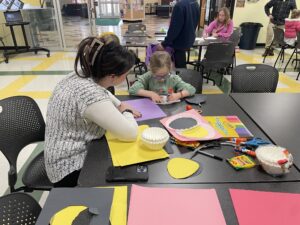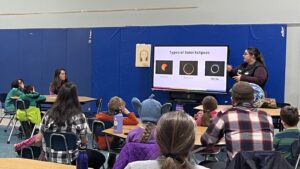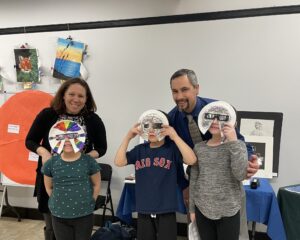Engaging Students and Families with STEM Education: Lessons from the 2024 Total Solar Eclipse
On April 8th, 2024, residents of New Hampshire and people across North America witnessed a rare celestial event – a total solar eclipse. Seeing this opportunity to bring together families, educators, and community members to share excitement for science and astronomy, the NH-Statewide Family Engagement Center (NH-SFEC)– an initiative managed in consortium by Campus Compact for NH (CCNH) and Partners for Rural Impact— in partnership with North Country Education Services (NCES) and White Mountains Science, Inc. (WMSI), organized a series of STEM eclipse workshops for educators in the Carroll, Coos, and Grafton Counties.
The primary objective of these workshops was to equip educators with essential techniques and activities to share with families and prepare students for safely experiencing the total solar eclipse. A key focus of these workshops was to inspire educators to organize STEM family events within their communities, emphasizing effective practices for engaging families in STEM education.
techniques and activities to share with families and prepare students for safely experiencing the total solar eclipse. A key focus of these workshops was to inspire educators to organize STEM family events within their communities, emphasizing effective practices for engaging families in STEM education.
Both in-person and virtual sessions of the educator STEM eclipse workshops were available to educators from diverse backgrounds including Head Start educators, K-12 teachers, and homeschool instructors. Reflecting on the experience, an elementary teacher from Berlin shared, “I’m excited to introduce my 5th graders to these training activities to enhance their understanding of the eclipse.” Similarly, a second-grade teacher expressed, “My goal is that my students comprehend what an eclipse is” illustrating the impact and enthusiasm generated by the workshops.
 To further assist the educators, WMSI provided them with the2024 Joyful Learning Guide to help facilitate relevant hands-on activities that can be recreated in a classroom or at STEM family events. The facilitation guide included four STEM topics relative to the eclipse that can be adapted for students of all ages with details of the activities and supplies used during the workshop. These training workshops resulted in regional educators of all ages hosting twenty-five family STEM-related events leading up to the eclipse throughout Northern NH. To see the eclipse as an opportunity to educate families and students on astronomy, physics, and math, Professor Emeritus of Physics and Astronomy, Dr. Douglas Arion from WMSI, said “It is one of the coolest things to ever happen because of its rarity. There can be centuries between being able to experience an event this exceptional.”
To further assist the educators, WMSI provided them with the2024 Joyful Learning Guide to help facilitate relevant hands-on activities that can be recreated in a classroom or at STEM family events. The facilitation guide included four STEM topics relative to the eclipse that can be adapted for students of all ages with details of the activities and supplies used during the workshop. These training workshops resulted in regional educators of all ages hosting twenty-five family STEM-related events leading up to the eclipse throughout Northern NH. To see the eclipse as an opportunity to educate families and students on astronomy, physics, and math, Professor Emeritus of Physics and Astronomy, Dr. Douglas Arion from WMSI, said “It is one of the coolest things to ever happen because of its rarity. There can be centuries between being able to experience an event this exceptional.”
 Notably, the eclipse events tailored for each community sparked discussions around topics such as eye safety, with students expressing concerns about potential eye damage from observing the sun directly. Knowing eye safety would be a concern, NCES and WMSI distributed over 13,000 eclipse glasses to forty-one schools across the northern regions, ensuring that students and families could safely observe the eclipse, thus removing barriers to obtaining these important safety glasses.
Notably, the eclipse events tailored for each community sparked discussions around topics such as eye safety, with students expressing concerns about potential eye damage from observing the sun directly. Knowing eye safety would be a concern, NCES and WMSI distributed over 13,000 eclipse glasses to forty-one schools across the northern regions, ensuring that students and families could safely observe the eclipse, thus removing barriers to obtaining these important safety glasses.
The NH-SFEC surveyed the impact of these workshops through the participation of all caregivers and educators who attended Eclipse STEM events across the north country, and it was significant. Of the responses:
• 96% of parents/caregivers reported that the events were beneficial for their child’s education.
• 84% of educators felt more confident in involving families in the classroom.
• 204 parents/caregivers participated.
• 38 educators across Coos, Carroll, and Grafton counties organized family STEM events.
• 25 events across Northern NH engaging over 200 families.
“This will be my sons’ second eclipse and my third” said a Woodland Community School parent. “We just happened to be around when they happen and its truly fascinating to experience.’’
From young children to seasoned astronomers, the total solar eclipse of 2024 was a chance for people of all ages to come together and witness a truly incredible event. The collaborative efforts of NH-SFEC, NCES, and WMSI not only enriched educators with valuable resources and knowledge but also fostered a culture of STEM engagement within communities and families. By leveraging events like the total solar eclipse, stakeholders in education can effectively promote STEM education and foster engagement through relevant and local experiences. The next total solar eclipse to touch New England will be 2079 and we can only hope that it will be just as magical and unforgettable as this one.